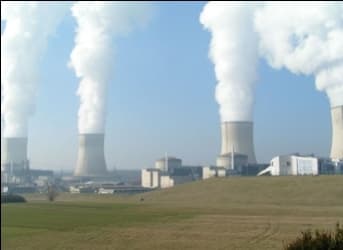South Korea gave a green light on January 29 to a $7 billion plan to build two new nuclear reactors, a sign that Korea will push forward with nuclear power despite its recent troubles with the technology. South Korea has 23 nuclear reactors in the country, but shut down its fourth reactor on Jan. 28 due to “technical” problems, raising the prospect of energy shortages this winter.
The move comes amid ongoing uncertainty over the role that nuclear power will play in the future of Korea’s energy mix, where it has traditionally been a centerpiece. Nuclear power makes up about one-third of Korea’s electricity generation, but the Fukushima crisis in Japan cast a long shadow over the industry in recent years, putting pressure on the government to back away from what became to be seen as a dangerous source of energy. Adding to the troubles, Korea’s nuclear industry has been engulfed in its own scandal in which equipment for nuclear reactors received fake safety certificates. Korea indicted 100 officials in the nuclear industry for the fraud, and the scandal threatened to do lasting damage to nuclear power throughout the country.
The approval of two new reactors gives renewed momentum for nuclear power while Korea zigzags on its nuclear energy policy. The previous government planned to make nuclear energy an increasingly important source of energy, growing its share of electricity generation to 41% by 2030, up from today’s share of one-third. However, earlier this month, the current government announced a reversal, scaling-back nuclear’s share to only 29% by 2035 – no doubt motivated by Fukushima and the fraudulent safety certificate scandal.
Related article: US Sailors Sue for Illnesses they Believe Caused by Fukushima
Building two new reactors shows that the Korean government wants to chart a middle path, moving forward with new reactors and relying on nuclear power for years to come, but not overly so. The government recognizes how much the economy relies on its reactors, and like Japan, lacks abundant indigenous energy resources and would suffer blackouts if it backed away too sharply.
Moreover, Korea hopes to support a thriving nuclear export industry. The Korea Electric Power Corp (Kepco) won a contract in 2009 to supply the United Arab Emirates with nuclear reactor technologies, stunning more renowned nuclear companies in the United States that have long dominated international nuclear exports. Korea wants to remain a big player for nuclear exports.
To add to the complexity, on January 28 South Korea affirmed its commitment to reduce its greenhouse gas emissions by 30% by 2020 below a business-as-usual baseline. The plan outlines emissions reduction targets sector-by-sector, including a 26.7% cut in emissions from power generation. South Korea plans to kick off a new emissions trading scheme (ETS) in 2015, which will give a boost to nuclear power. Put another way, as source of low-carbon energy, Korea will need to rely more heavily on nuclear power as it seeks to displace dirtier sources of energy and meet its climate goals.
If, on the other hand, Korea sought to shut down its nuclear power sector in much of the way that Japan has, it would be forced to import more coal, LNG, and oil to fuel its economy.
Korea may have lowered its target for nuclear power earlier this month, but it also firmed up its commitment over the long-run.
ADVERTISEMENT
By. Nick Cunningham


















